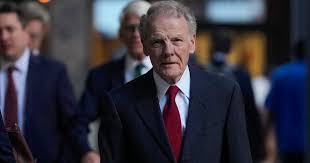The long-awaited corruption trial of former Illinois House Speaker Michael Madigan began Monday at the Dirksen Federal Courthouse, with federal prosecutors and defense attorneys setting the stage for one of the most significant political trials in Illinois history. Following two weeks of jury selection, opening statements got underway, highlighting a high-stakes legal battle over allegations of corruption, bribery, and fraud that spanned nearly a decade.
Federal prosecutors wasted no time in delivering a strong opening. Assistant U.S. Attorney Sarah Streicker led with a sharp accusation, telling jurors, “This is a case about corruption at the highest level.” Madigan, who served as a powerful figure in Illinois politics for decades, sat quietly as Streicker outlined the government’s case against him and his co-defendant, lobbyist Michael McClain.
According to the prosecution, Madigan, 82, and McClain are facing a 23-count indictment that includes racketeering, conspiracy, bribery, and wire fraud charges. The indictment accuses them of running a long-standing scheme to use Madigan’s political influence for personal gain. Prosecutors say they have evidence showing how Madigan leveraged his position as Speaker to secure no-show jobs and other benefits for his associates through companies like utility giant ComEd, in exchange for political favors.
Streicker’s opening remarks were meant to set the tone for the prosecution’s case. She stated that the government would present witness testimonies, documents, emails, and secretly recorded conversations to expose how Madigan and McClain allegedly orchestrated schemes to enrich themselves and maintain political control. “This was the defendant’s racket—the corruption of public office for private gain,” she said.
At the core of the case are secret audio recordings that captured Madigan discussing various deals, which prosecutors argue are clear evidence of his intent to use his office for personal benefit. CBS 2 Legal Analyst Irv Miller emphasized the importance of these recordings, stating, “The prosecution is saying you don’t have to believe witnesses, it’s on tape.”
Madigan’s defense attorney, Tom Breen, presented a different narrative. In his opening statement, he portrayed Madigan as an honest politician who acted within the boundaries of the law. Breen criticized the prosecution’s case, arguing that it relies on unreliable sources and overzealous efforts to criminalize what he described as traditional political practices. “They looked through a keyhole and made decisions. We’re asking you to open the door and look at the entire room,” Breen told the jury.
Breen emphasized Madigan’s long-standing role in helping constituents and suggested that his actions were misunderstood. “If you’re someone looking for a job, (Madigan) will help you get a job. He’ll do it for his political supporters, but he’ll also do it for a man on the street,” Breen added. The defense’s strategy seems to hinge on casting doubt on the credibility of government witnesses, who they argue have ulterior motives and are seeking leniency by cooperating with prosecutors.
A significant part of the trial focuses on Madigan’s alleged involvement with ComEd. Prosecutors claim Madigan used his position to push legislation favorable to the utility company, while ComEd provided lucrative no-show jobs to his political associates. These jobs, prosecutors allege, were a way of rewarding loyalty to Madigan and ensuring his continued political dominance.
“From 2011 to 2019, Madigan abused his power and used the organizations he led in a pattern of corruption over and over again,” Streicker said during her opening statement. The prosecution plans to highlight at least five instances of such behavior, which they claim demonstrate a consistent pattern of corruption.
The trial’s first day saw a packed courtroom, including the presence of Madigan’s daughter, Lisa Madigan, the former Illinois attorney general. The trial is expected to last several weeks, with the prosecution laying out its case before the defense presents its counterarguments.
Attorneys for Michael McClain, Madigan’s longtime confidant, are set to deliver their opening statements on Tuesday. Afterward, prosecutors will begin presenting evidence, starting with the alleged Come bribery scheme, which has been a focal point of the case.
Legal analysts predict that the trial will be a defining moment in Illinois’ long history of political corruption cases, with Madigan’s legacy hanging in the balance. If convicted, Madigan could face decades in prison, marking a stunning fall from grace for a man who once wielded unmatched power in the state.
As both sides prepare to present their evidence, the trial promises to offer a rare glimpse into the inner workings of Illinois politics. For many residents, the case represents a chance to hold one of the state’s most powerful figures accountable, while others see it as an example of the complexities of political power and influence.
Regardless of the outcome, the trial of Michael Madigan will likely be remembered as a pivotal chapter in the ongoing battle against corruption in Illinois.
